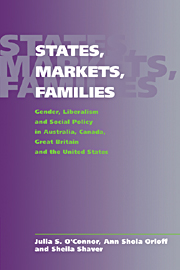 States, Markets, Families
States, Markets, Families Book contents
- Frontmatter
- Contents
- List of Tables
- Acknowledgements
- 1 Gendering Theories and Comparisons of Welfare States
- 2 Liberalism, Gender and Social Policy
- 3 The Labour Market and Social Policy
- 4 Social Rights Versus Gender Stratification and Gender Power?
- 5 Body Rights, Social Rights and Reproductive Choice
- 6 Liberalism, Gendered Policy Logics and Mobilisation
- 7 States, Markets, Families
- References
- Index
2 - Liberalism, Gender and Social Policy
Published online by Cambridge University Press: 27 October 2009
- Frontmatter
- Contents
- List of Tables
- Acknowledgements
- 1 Gendering Theories and Comparisons of Welfare States
- 2 Liberalism, Gender and Social Policy
- 3 The Labour Market and Social Policy
- 4 Social Rights Versus Gender Stratification and Gender Power?
- 5 Body Rights, Social Rights and Reproductive Choice
- 6 Liberalism, Gendered Policy Logics and Mobilisation
- 7 States, Markets, Families
- References
- Index
Summary
The ideology of liberalism is a defining element of the liberal welfare state type (Esping-Andersen 1990: 41–4), yet what this ideology implies for social policy institutions has been largely taken for granted. Comparative analysis has focused on the economic dimensions of liberalism, primarily the liberal valuation of the individual and the central roles of the market and voluntary effort in social provision. Typically, liberalism's broader social policy content has been evoked with general references to Titmuss's (1974: 30–2) model of residual social policy, in which public policy has a role only when market and family fail. Discussion of the liberal type has given little attention to those aspects of liberal ideology which refer to gender and the relation between state and family, and to the way these aspects are expressed in social policy institutions. This chapter addresses that gap.
Interestingly, the comparative literature has had rather more to say about the relations between state and family which characterise other regime types. It has noted the importance of religious principles in shaping these relations in the corporatist policy regimes of continental Europe (Flora 1986: xviii). The Catholic concept of subsidiarity sees the relation between state and family as a hierarchy of governance, with authority supposed to remain at the lowest level possible. Its Protestant counterpart in the doctrine of sphere sovereignty views family, state and church as separate and distinct spheres of authority. Both principles entail state support for traditional family structure, and these states have been less responsive to women's demands than their liberal counterparts (Ostner 1993). In sharp contrast, Scandinavian social democratic policy regimes have drawn on a communitarian tradition in which state and society are seen as mutually interlocking.
- Type
- Chapter
- Information
- States, Markets, FamiliesGender, Liberalism and Social Policy in Australia, Canada, Great Britain and the United States, pp. 43 - 65Publisher: Cambridge University PressPrint publication year: 1999
- 1
- Cited by


